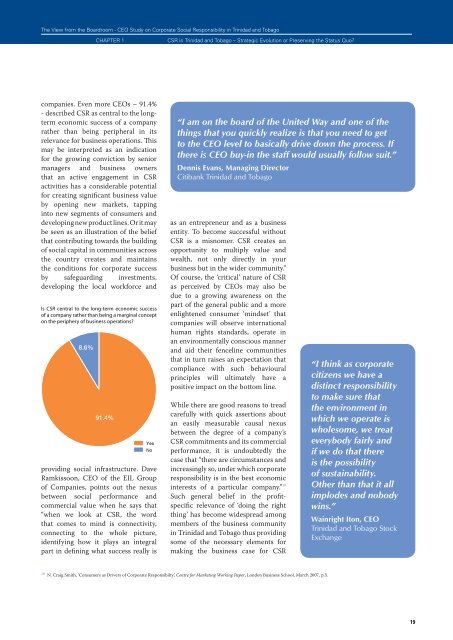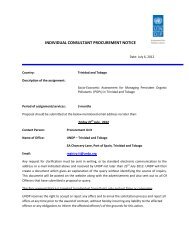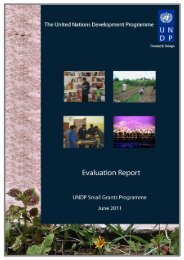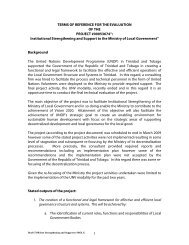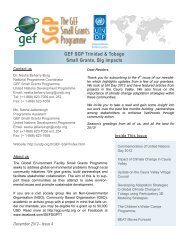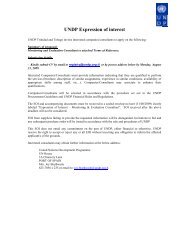The View from the Boardroom - UNDP Trinidad and Tobago
The View from the Boardroom - UNDP Trinidad and Tobago
The View from the Boardroom - UNDP Trinidad and Tobago
You also want an ePaper? Increase the reach of your titles
YUMPU automatically turns print PDFs into web optimized ePapers that Google loves.
<strong>The</strong> <strong>View</strong> <strong>from</strong> <strong>the</strong> <strong>Boardroom</strong> - CEO Study on Corporate Social Responsibility in <strong>Trinidad</strong> <strong>and</strong> <strong>Tobago</strong>CHAPTER 1CSR in <strong>Trinidad</strong> <strong>and</strong> <strong>Tobago</strong> – Strategic Evolution or Preserving <strong>the</strong> Status Quo?companies. Even more CEOs – 91.4%- described CSR as central to <strong>the</strong> longtermeconomic success of a companyra<strong>the</strong>r than being peripheral in itsrelevance for business operations. Thismay be interpreted as an indicationfor <strong>the</strong> growing conviction by seniormanagers <strong>and</strong> business ownersthat an active engagement in CSRactivities has a considerable potentialfor creating significant business valueby opening new markets, tappinginto new segments of consumers <strong>and</strong>developing new product lines. Or it maybe seen as an illustration of <strong>the</strong> beliefthat contributing towards <strong>the</strong> buildingof social capital in communities across<strong>the</strong> country creates <strong>and</strong> maintains<strong>the</strong> conditions for corporate successby safeguarding investments,developing <strong>the</strong> local workforce <strong>and</strong>Is CSR central to <strong>the</strong> long-term economic successof a company ra<strong>the</strong>r than being a marginal concepton <strong>the</strong> periphery of business operations?8.6%91.4%YesNoproviding social infrastructure. DaveRamkissoon, CEO of <strong>the</strong> EIL Groupof Companies, points out <strong>the</strong> nexusbetween social performance <strong>and</strong>commercial value when he says that“when we look at CSR, <strong>the</strong> wordthat comes to mind is connectivity,connecting to <strong>the</strong> whole picture,identifying how it plays an integralpart in defining what success really is“I am on <strong>the</strong> board of <strong>the</strong> United Way <strong>and</strong> one of <strong>the</strong>things that you quickly realize is that you need to getto <strong>the</strong> CEO level to basically drive down <strong>the</strong> process. If<strong>the</strong>re is CEO buy-in <strong>the</strong> staff would usually follow suit.”Dennis Evans, Managing DirectorCitibank <strong>Trinidad</strong> <strong>and</strong> <strong>Tobago</strong>as an entrepreneur <strong>and</strong> as a businessentity. To become successful withoutCSR is a misnomer. CSR creates anopportunity to multiply value <strong>and</strong>wealth, not only directly in yourbusiness but in <strong>the</strong> wider community.”Of course, <strong>the</strong> ‘critical’ nature of CSRas perceived by CEOs may also bedue to a growing awareness on <strong>the</strong>part of <strong>the</strong> general public <strong>and</strong> a moreenlightened consumer ‘mindset’ thatcompanies will observe internationalhuman rights st<strong>and</strong>ards, operate inan environmentally conscious manner<strong>and</strong> aid <strong>the</strong>ir fenceline communitiesthat in turn raises an expectation thatcompliance with such behaviouralprinciples will ultimately have apositive impact on <strong>the</strong> bottom line.While <strong>the</strong>re are good reasons to treadcarefully with quick assertions aboutan easily measurable causal nexusbetween <strong>the</strong> degree of a company’sCSR commitments <strong>and</strong> its commercialperformance, it is undoubtedly <strong>the</strong>case that “<strong>the</strong>re are circumstances <strong>and</strong>increasingly so, under which corporateresponsibility is in <strong>the</strong> best economicinterests of a particular company.” 10Such general belief in <strong>the</strong> profitspecificrelevance of ‘doing <strong>the</strong> rightthing’ has become widespread amongmembers of <strong>the</strong> business communityin <strong>Trinidad</strong> <strong>and</strong> <strong>Tobago</strong> thus providingsome of <strong>the</strong> necessary elements formaking <strong>the</strong> business case for CSR“I think as corporatecitizens we have adistinct responsibilityto make sure that<strong>the</strong> environment inwhich we operate iswholesome, we treateverybody fairly <strong>and</strong>if we do that <strong>the</strong>reis <strong>the</strong> possibilityof sustainability.O<strong>the</strong>r than that it allimplodes <strong>and</strong> nobodywins.”Wainright Iton, CEO<strong>Trinidad</strong> <strong>and</strong> <strong>Tobago</strong> StockExchange10 N. Craig Smith, ‘Consumers as Drivers of Corporate Responsibilty’, Centre for Marketing Working Paper, London Business School, March 2007, p.3.19


